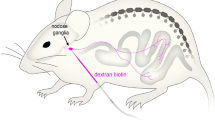Abstract.
Results from basic research implicate a role for bioactive peptides in controlling the mammalian lower urinary tract. Although various peptides are assumed to be involved in the potentiaton or inhibition of cholinergic or purinergic activity in the urinary bladder, there is still much controversy regarding the mode of action and functional significance of such peptides in detrusor smooth muscle. Thus, we evaluated the functional effects of atrial natriuretic peptide (ANP), calcitonin gene related peptide (CGRP), endothelin 1 (ET-1), substance P (SP) and vasoactive intestinal polypeptide (VIP) on isolated strip preparations of human detrusor smooth muscle and determined the presence of those peptides in the human detrusor by means of immunohistochemistry. The effects of peptides on isometric tension of isolated detrusor strip preparations and on tissue levels of cyclic nucleotides cAMP and cGMP were compared to those of adenylyl cyclase activator forskolin (F), nitric oxide donor Na+-nitroprusside (SNP) and non-specific phosphodiesterase (PDE) inhibitor papaverine (P). The effects of the compounds on isometric tension of isolated human detrusor smooth muscle were examined using the organ bath technique. To determine time- and dose-dependent effects on cyclic nucleotide levels, bladder strips were exposed to increasing doses of F, SNP, P, ANP, CGRP and VIP, then rapidly frozen in liquid nitrogen and homogenised in the frozen state. cAMP and cGMP were extracted and assayed using specific radioimmunoassays. The presence of peptides was investigated by light microscopy using the Avidin-Biotin-Complex (ABC) method. F, P and VIP most effectively reversed the carbachol-induced tension of isolated human detrusor strips. Relaxing effects of ANP, CGRP and SNP were negligible. In contrast, ET-1 and SP elicited dose-dependent contractions of the tissue. The relaxing effects of F, P and VIP were accompanied by an increase in cAMP and cGMP levels, respectively. Light microscopy revealed positive immunostaining for CGRP, ET 1, VIP and SP in sections of the detrusor muscle coat. Our results suggest a possible importance of ET 1, SP and VIP in regulating detrusor smooth muscle contraction and relaxation. Even if a peptide is not synthesised, stored or released in a smooth muscle tissue and is, therefore, unable to reach its target cells under physiologic conditions, a functional effect on the tissue might be mediated by peptide-binding to specific cell surface receptors.
Similar content being viewed by others
Author information
Authors and Affiliations
Additional information
Electronic Publication
Rights and permissions
About this article
Cite this article
Ückert, S., Stief, C.G., Lietz, B. et al. Possible role of bioactive peptides in the regulation of human detrusor smooth muscle – functional effects in vitro and immunohistochemical presence. World J Urol 20, 244–249 (2002). https://doi.org/10.1007/s00345-002-0287-y
Received:
Accepted:
Issue Date:
DOI: https://doi.org/10.1007/s00345-002-0287-y




